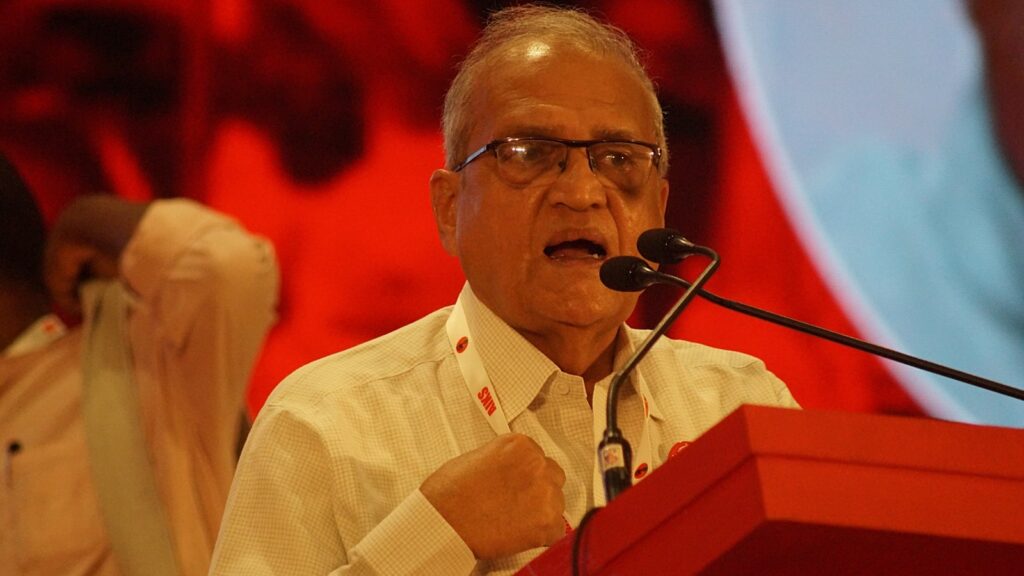The smooth passage of the Maharashtra Special Public Security (MSPS) Bill in the state Assembly recently saw the members of the Opposition Maha Vikas Aghadi (MVA), which includes the Congress, NCP(SP) and Shiv Sena (UBT), failing to even express their dissent against the legislation dubbed as “Urban Naxal Bill”, which seeks “effective prevention of certain unlawful activities of Left-wing extremist organisations”. The only dissenter from the Opposition ranks on the floor of the House was CPI(M) MLA Vinod Nikole. The Bill’s critics have warned that it grants sweeping powers to the State that could criminalise dissent and ideological activity under the pretext of curbing Naxalism, raising fears of arbitrary arrests.
In an interview with The Indian Express, CPI(M) Politburo member and All India Kisan Sabha (AIKS) chief Ashok Dhawale says the MSPS Bill marks a “direct assault on democratic rights and civil liberties”, calling the MVA MLAs’ silence in the House “unfortunate”. Excerpts:
The CPI(M) has come out strongly against the MSPS Bill. Could you explain the reasons behind your opposition?
We are completely opposed to this Bill. At its core, it is a direct attack on democratic rights and civil liberties. The government is using the so-called “urban Naxal” threat as a red herring, an excuse to target dissent and silence critics of the ruling BJP and their corporate backers.
Maharashtra Chief Minister Devendra Fadnavis has publicly stated that the Naxal issue in Maharashtra is confined to just two tehsils in Gadchiroli. Union Home Minister Amit Shah also has publicly stated that the Naxalite Maoist problem has largely been eliminated nationwide. So, the question arises if the threat is under control, why this new law now?
The government claims it is a security measure. Are you saying there is more to it?
This law is not about security, it is about silencing voices. There are already enough draconian laws in place — UAPA at the national level, and MCOCA in Maharashtra. Some provisions in this new Bill are even more draconian than UAPA. So clearly, it’s not about lack of legal tools.
We believe this is being brought in to suppress growing people’s movements in the state like the farmers fighting against land acquisition for the Shaktipeeth Highway, or resistance to corporate-led projects in Dharavi, Wadhwan port, and areas like Gadchiroli and Chandrapur. These projects, pushed by big corporates, especially mining projects in districts like Gadchiroli and Chandrapur for which land acquisition process has started, often violate forest and land rights. The Bill is a tool to criminalise these legitimate struggles.
While you have criticised the Mahayuti government, several of your own allies in the MVA have been criticised for not opposing the Bill. What is your take?
The record of the MVA who are our allies has been mixed. I would describe what happened in the Assembly as unfortunate. However, to be fair, several top MVA leaders joined earlier protests against this Bill. On June 3, there was a massive dharna at Azad Maidan, and leaders like Supriya Sule, Jayant Patil, and Uddhav Thackeray were present where they were categorical about their opposition to the Bill. On April 22, nearly 50,000 people protested against this Bill across Maharashtra. Though that was a Left-led call, many MVA leaders joined in solidarity.
However, we were disappointed that when the Bill was introduced in the Assembly, only our MLA Vinod Nikole of the CPI(M) stood up to oppose it. Not a single MLA from the MVA bloc spoke out. On the same day we had an online meeting with NCP (SP) leader Jayant Patil and we raised this issue with him. We were told that several MVA MLAs who were part of the Select Committee had already opposed the Bill in that House Committee. But we believe that not opposing it on the Assembly floor sent the wrong message. It has not gone down well with the people of the state.
To their credit, the very next day in the Legislative Council, the MVA rectified this mistake, where they unitedly opposed the Bill and walked out in protest. That act did some damage control, and we welcomed it.
What are your expectations from the MVA now? And, are you planning to take any legal recourse against the Bill?
Of course, we will examine legal options, but we are realistic. Generally, courts do not interfere in legislative processes. So we are not placing much emphasis on legal challenges.
The real battle is on the streets. The farm laws passed by Parliament were ultimately repealed through mass struggle. Similarly, if we want to defeat this draconian Bill, we need a broad-based, united mass movement. We are trying to bring all forces together to make that happen. Speeches alone will not see the end of this Bill. We, including the major constituents of the MVA, will need to hit the streets. We are trying to persuade them. Let us see what happens.
Would you like some provisions of the Bill to be diluted, or you want the bill to be repealed?
The government had called for suggestions and objections to this Bill and it received 12,500 suggestions. Out of these, 9000 suggestions sought a complete scrapping of the Bill while another 3,000 called for amendments. We believe that the Bill in its entirety is harmful for the citizens of the state. We are not protesting so that the government tweak this law — we want it to be thrown out entirely.

